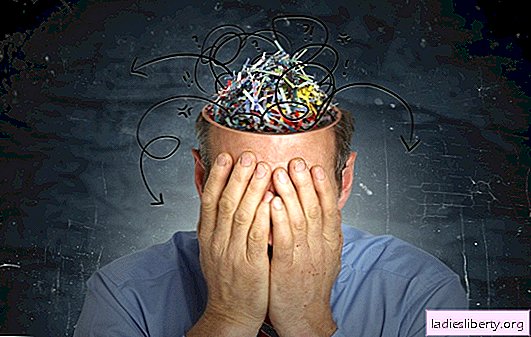
How do you imagine the most productive day for you? Surely such when you managed to complete all the planned tasks, while not feeling squeezed like a lemon. How to manage your time?
To do this, you need to understand the features of our brain, biorhythms and their functions. Indeed, at a certain time of the day, our mental organ can itself be tuned to a certain type of activity. Having studied some recommendations, you will be able to plan your business correctly, build your daily schedule in such a way as to get the maximum benefit.
Long-term memory
Man is not a robot; he cannot work equally well all day. It is a living system that needs to rest after every busy period. The brain needs order and stability, so for maximum efficiency try to follow your biorhythms every day. For example, morning should start at the same time, so the brain will get used to starting work in a certain period.
For a productive start to the day, it is best to wake up from 6 a.m. to 7 a.m. At this time, our brain produces the so-called “window”, which stimulates the brain to work in the direction of long-term memory.
Therefore, if you need to quickly and easily remember something, try to absorb the information in the early morning.
Active phase time
Of course, each person is individual, his biorhythms are not subject to any laws, and these recommendations may not be correctly interpreted by a number of people. Indeed, many people work at night rather than rest, in response, the body adapts to certain conditions and changes its usual mode.
It is important to understand that it is quite possible to make the brain work in a way that is convenient for you.
However, the standard rhythm of human life begins precisely in the early morning, so we will not deviate from the classical recommendations.
In the period from 8 to 10 o'clock in the morning, the greatest activity of the brain is manifested, when logic works at the peak of its capabilities. It is in the morning that it is better to engage in analytical work and remember important information. Tasks aimed at statistics are also easy.
Therefore, lessons at school and a day at the office begin between 8 and 9 in the morning, when the brain can easily cope with difficult tasks.
Time to switch
At lunchtime, it is best to take a break for the brain, do something simple and not strain your intellect.
It is advisable to combine the rest period of the brain and body, it is best to do this from 11 to 12 hours of the day.
Use the decrease in brain activity to the benefit, pay attention to simple things that will benefit and enjoy. For example, go in for sports, thereby increasing your appetite before dinner, listen to your favorite music while walking in the fresh air, chat with family on the phone, etc.
Digestion fire
The effect of food on brain function is very great. You yourself might have noticed that after a hearty dinner you never want to lie down and take a nap, or take a walk, in every way relaxing from mental activity.
In the period from 13 to 14 hours of the day, you must have lunch, because it is at this time that all food is very easily digested.
In some countries, it is customary to have a short lunch sleep immediately after a meal.
Scientists from the University of Manchester claim that after eating, the brain cells responsible for the state of activity and wakefulness are “braked” sharply.
Excessive brain activity leads to mental overstrain, then it is difficult to pack up and tune in to at least some kind of work. A little rest will benefit your body, and you will be able to integrate into the labor process with renewed vigor.
Time to work
A break restores motivation, so do not neglect the rest during the lunch hours.
The period from 2 p.m. to 6 p.m. is most suitable for work and active brain activity.
Most often, during this period of time, most of the work is performed. To stimulate your performance and attention, it is important not to be distracted by extraneous factors, and feeling hunger can be content with fruits, seeds and nuts.
Brain activity is on the decline
Some people like to play sports in the evening. Experts are sure that sweating is better at this time, the body is tuned to sleep and an appetite is played out.
Also, from 18 to 21 p.m. you can do household chores, a shopping trip, planning a weekend, etc.
The main thing is not to load the brain, because its activity is very reduced and requires rest and recovery.
It is not in vain that they say: “the morning of the evening is wiser”, therefore never decide important matters in the evenings.
Nervous System Rest
From 9 p.m. to 11 p.m., our brain needs complete rest.
At such a time, a person may notice that he cannot gather his thoughts, no ideas come to his mind and just want to sleep.
This period is ideal for relaxing the whole body, it is advisable to take a bath, do foot massage, moisturize the skin and relax.
You must fall asleep before 11 p.m., otherwise you risk not restoring your strength before the next day.
Nervous system recovery
From 23 to 1 am there is a complete restoration of the subtle energy force. In China it is called “qi”, in India “prana”, and in modern medicine there is a concept - muscle and nervous strength.
When studying human biorhythms, you may find that this watch is considered the most important for sleep.
The body is restored several times faster and better if you fall asleep before 23 a.m.
To help yourself in this process, you need to follow some rules for proper sleep:
- Before going to bed, it is advisable to take a warm bath.
- Do not go to bed on an empty stomach, this can lead to insomnia.
- The temperature in the room should not be higher than 22 degrees.
- Choose your sleepwear and bedding so that you feel comfortable and warm.
- Leave your gadgets on the bedside table.
- Turn off the TV and other irritants before you go to bed.
To relax the brain, you can turn on quiet, calm music.
Recovery and Awakening
Sleeping late at night helps restore emotional energy. It is from 1 to 3 am there is a regeneration of the psychological state of a person.
Why up to 3 hours? Because then the brain begins to gradually “wake up”.
However, it is worth noting that these characteristics are not suitable for everyone. After all, the pace of life is different for everyone, someone gets up every day at 4-5 in the morning, and it’s hard for someone to tear themselves from the pillow even at lunchtime.
Most people say that it is from 4 to 6 in the morning that inspiration and clarity of mind comes to them.
But this is rather an exception to the rules of the correct daily routine. So what time of day does the brain work best? It turns out that each time period has its own nuances, observing which you can get the maximum benefit from any time of the day.











